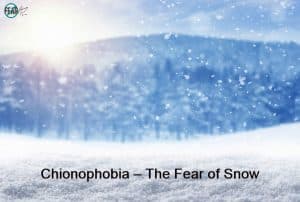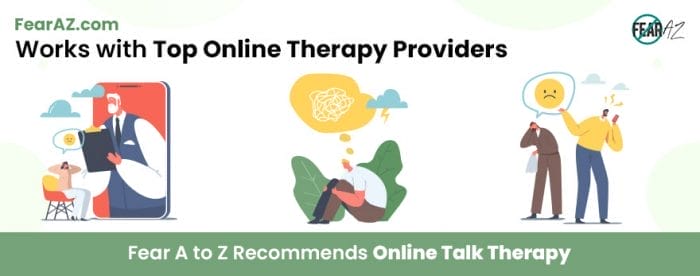Share This Article
Fluffy White Snow, Harmless? Not If You Have Chionophobia
Do you look for excuses not to leave the house in the winter? Are you terrified by the white carpet of snow that seems majestic to everyone else? Do you find yourself racing to the safe confines of home the minute the snow starts to fall?
You have no way of explaining why your eyes are glued to the weather report during the winter. Or why when winter holidays require you to walk out into the snow, you feel anxious. As a matter of fact, a white Christmas doesn’t fill you with joy like it does your family and friends.
If you relate to any of those scenarios, you may have chionophobia, or the fear of snow.
Living with such a fear is probably difficult and not easily understood by those who haven’t experienced it. Family and friends may tend to avoid the topic, viewing it as silly or thinking you’re simply trying to seek attention. However, to someone struggling with chionophobia, the fear is very real.
But there’s no need to lose hope. There are many treatment methods you can try. Read on to learn more.

What Causes the Phobia of Snow?
The term chionophobia originates from the Greek word chion, which refers to snow, and phobia which means fear. Chionophobia is the irrational fear of snow, and it is usually linked with the fear of death or physical harm.
Phobias manifest differently in different people based on their individual experiences. However, there are two prominent fears at the root of chionophobia. The first is the fear of being blockaded by snow or stuck in or held captive by it. The second is the fear of being stranded alone in the snow.
Chionophobia often originates from a negative childhood experience. It might be because you were hit with a hard snowball or were the victim of an accident on snowy or icy roads.
Snow often comes with harsh weather conditions which could result in being snowed in, loss of power, frozen pipes, or fallen trees. All these factors could prove dangerous. The thought of such dangers might develop into a fear of snow.
You may realize that your fear is irrational and unfounded. However, you still have a hard time accepting those facts let alone controlling your reaction. At times you may tend to refuse to step outside the door if snow covers the otherwise clear roads and driveways.
Symptoms of Chionophobia
Like all other phobias, chionophobia tends to cause varied symptoms.
Mental/Emotional Symptoms
The most common symptom of chionophobia is paying undue attention to weather reports. You begin to get stubborn and refuse to step out of the house when the weather is snowy. The fear of snow and stormy weather may sometimes fill you with a sense of dread and doom. This may lead to trembling and, in some cases, even panic attacks.
Chionophobia can also lead to depression.
Physical Symptoms
The physical symptoms of chionophobia include crying, screaming, shaking, and in some cases even vomiting. Other symptoms include heart palpitations and stomach disorders.
A rapid increase in heartbeat, trembling, nausea, and difficulty in breathing are other commonly observed physical symptoms of a fear of snow. You may also sweat excessively and feel like you are choking when the fear is triggered.
Like other phobias, chionophobia is an irrational fear. However, if you find that chionophobia is interrupting your daily life, it may be time to seek help.
Self-Help: What Can You Do for Yourself?
Before considering seeking professional help, try solving the problem on your own. After all, self-help is the best help. Since the mind tends to believe what you tell it, you can try reassuring yourself that it’s going to be okay.
Relaxation techniques such as breathing exercises and meditation can go a long way in calming the mind when the phobia is triggered. Counting numbers and reassuring yourself with positive thoughts and statements have also proven to be helpful in the long run.
An alternative method in treating chionophobia would be to expose yourself to your object of fear. With your phobia at its peak, it may sound impossible to do, but where there’s a will there’s a way. Maybe start small by simply watching the snow fall from the safety of your home. As you grow more confident, step out into the snow to stand or even for a short walk. As you continue to expose yourself to the snow, which may be difficult at times, you will find your fears slowly fade as you progress.
Gradually exposing yourself to wintertime activities also helps reduce your snow anxiety.
Professional Help for the Fear of Snow
Depending on the severity of your symptoms, it may be best to seek professional help. In some cases, extreme fear might affect the daily functioning of your life. It may affect your work and career. It’s important not to ignore symptoms, but instead seek treatment to get to the root of the fear.
Hypnotherapy has proven to be an effective remedy for treating various social phobias, including the fear of snow. It relaxes you deeply, allowing the therapist to understand the root cause of the phobia. In turn, you’ll be more open to suggestions on ways to overcome it. The therapy is known for its ability to reduce the severity and recurrence of panic attacks, which you may be suffering from as well.
Coping with Chionophobia
Treatment in no way guarantees your phobia will vanish. However, it will allow you to better manage your fear as opposed to being controlled by it. You may no longer feel the same levels of anxiety when in contact with snow, and will finally be able to cope with the fear.
Overcoming chionophobia can go a long way in helping you lead a more normal life. Who knows? One day you might even be able to go skiing with your friends or enjoy the fun-loving spirit that comes with a white Christmas.




